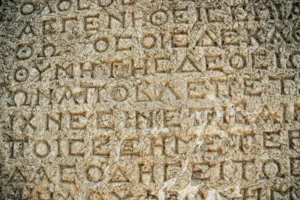Grammar cases in Modern Greek
What are the four cases in Modern Greek?
The four cases of Modern Greek are as follows:
nominative case = ονομαστική πτώση
genitive case = γενική πτώση
accusative case = αιτιατική πτώση
vocative case = κλητική πτώση
The use of nominative case
Nominative case is the case of the subject in sentences.
Examples:
Ο Δημήτρης διαβάζει ένα βιβλίο.
Ο σκύλος τρώει το φαγητό του.
Subject in the nominative case: Ο Δημήτρης
Subject in the nominative case: Ο σκύλος
The use of genitive case
Genitive case can be used as subject in sentences with a small number of verbs.
Example:
Ο Δημήτρης μοιάζει του αδερφού του.
Genitive case expresses possession.
Example:
Το βιβλίο της Μαρίας είναι πάνω στο γραφείο.
The use of accusative case
Nominative case is the case of the subject in sentences.
Examples:
Η Ελένη αγαπάει τον Κώστα.
Ο Κώστας αγαπάει την Ελένη.
The use of vocative case
Vocative case is used when we speak to somebody directly.
Examples:
Δημήτρη, είσαι εδώ; – Dimitris, are you here?
Άγγελε, έλα εδώ! – Angel, come here!
Possible difficulties in cases for bilingual students
– to erase the ending letter -s from the accusative case of masculine nouns
– to realise when to use the nominative or the accusative case in sentences
– to use the articles in the correct case before the nouns
Vocabulary – Λεξιλόγιο
1/ η πτώση – οι πτώσεις = case – cases
2/ το ουσιαστικό – τα ουσιαστικά = noun – nouns
3/ το αρσενικό = masculine
4/ το θηλυκό = feminine
5/ το ουδέτερο = neutral
6/ το γένος = gender







